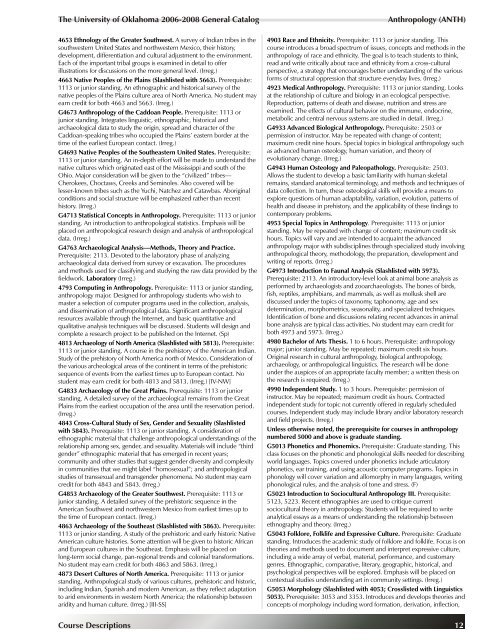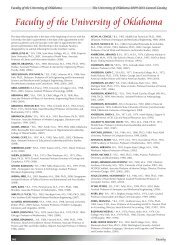ART - Catalog - University of Oklahoma
ART - Catalog - University of Oklahoma
ART - Catalog - University of Oklahoma
You also want an ePaper? Increase the reach of your titles
YUMPU automatically turns print PDFs into web optimized ePapers that Google loves.
The Uni ver sity <strong>of</strong> <strong>Oklahoma</strong> 2006-2008 Gen eral Cat a log<br />
Anthropology (ANTH)<br />
4653 Ethnology <strong>of</strong> the Greater Southwest. A survey <strong>of</strong> Indian tribes in the<br />
southwestern United States and northwestern Mexico, their history,<br />
development, differentiation and cultural adjustment to the environment.<br />
Each <strong>of</strong> the important tribal groups is examined in detail to <strong>of</strong>fer<br />
illustrations for discussions on the more general level. (Irreg.)<br />
4663 Native Peoples <strong>of</strong> the Plains (Slashlisted with 5663). Prerequisite:<br />
1113 or junior standing. An ethnographic and historical survey <strong>of</strong> the<br />
native peoples <strong>of</strong> the Plains culture area <strong>of</strong> North America. No student may<br />
earn credit for both 4663 and 5663. (Irreg.)<br />
G4673 Anthropology <strong>of</strong> the Caddoan People. Prerequisite: 1113 or<br />
junior standing. Integrates linguistic, ethnographic, historical and<br />
archaeological data to study the origin, spread and character <strong>of</strong> the<br />
Caddoan-speaking tribes who occupied the Plains’ eastern border at the<br />
time <strong>of</strong> the earliest European contact. (Irreg.)<br />
G4693 Native Peoples <strong>of</strong> the Southeastern United States. Prerequisite:<br />
1113 or junior standing. An in-depth effort will be made to understand the<br />
native cultures which originated east <strong>of</strong> the Mississippi and south <strong>of</strong> the<br />
Ohio. Major consideration will be given to the “civilized” tribes—<br />
Cherokees, Choctaws, Creeks and Seminoles. Also covered will be<br />
lesser-known tribes such as the Yuchi, Natchez and Catawbas. Aboriginal<br />
conditions and social structure will be emphasized rather than recent<br />
history. (Irreg.)<br />
G4713 Statistical Concepts in Anthropology. Prerequisite: 1113 or junior<br />
standing. An introduction to anthropological statistics. Emphasis will be<br />
placed on anthropological research design and analysis <strong>of</strong> anthropological<br />
data. (Irreg.)<br />
G4763 Archaeological Analysis—Methods, Theory and Practice.<br />
Prerequisite: 2113. Devoted to the laboratory phase <strong>of</strong> analyzing<br />
archaeological data derived from survey or excavation. The procedures<br />
and methods used for classifying and studying the raw data provided by the<br />
fieldwork. Laboratory (Irreg.)<br />
4793 Computing in Anthropology. Prerequisite: 1113 or junior standing,<br />
anthropology major. Designed for anthropology students who wish to<br />
master a selection <strong>of</strong> computer programs used in the collection, analysis,<br />
and dissemination <strong>of</strong> anthropological data. Significant anthropological<br />
resources available through the Internet, and basic quantitative and<br />
qualitative analysis techniques will be discussed. Students will design and<br />
complete a research project to be published on the Internet. (Sp)<br />
4813 Archaeology <strong>of</strong> North America (Slashlisted with 5813). Prerequisite:<br />
1113 or junior standing. A course in the prehistory <strong>of</strong> the American Indian.<br />
Study <strong>of</strong> the prehistory <strong>of</strong> North America north <strong>of</strong> Mexico. Consideration <strong>of</strong><br />
the various archeological areas <strong>of</strong> the continent in terms <strong>of</strong> the prehistoric<br />
sequence <strong>of</strong> events from the earliest times up to European contact. No<br />
student may earn credit for both 4813 and 5813. (Irreg.) [IV-NW]<br />
G4833 Archaeology <strong>of</strong> the Great Plains. Prerequisite: 1113 or junior<br />
standing. A detailed survey <strong>of</strong> the archaeological remains from the Great<br />
Plains from the earliest occupation <strong>of</strong> the area until the reservation period.<br />
(Irreg.)<br />
4843 Cross-Cultural Study <strong>of</strong> Sex, Gender and Sexuality (Slashlisted<br />
with 5843). Prerequisite: 1113 or junior standing. A consideration <strong>of</strong><br />
ethnographic material that challenge anthropological understandings <strong>of</strong> the<br />
relationship among sex, gender, and sexuality. Materials will include “third<br />
gender” ethnographic material that has emerged in recent years;<br />
community and other studies that suggest gender diversity and complexity<br />
in communities that we might label “homosexual”; and anthropological<br />
studies <strong>of</strong> transsexual and transgender phenomena. No student may earn<br />
credit for both 4843 and 5843. (Irreg.)<br />
G4853 Archaeology <strong>of</strong> the Greater Southwest. Prerequisite: 1113 or<br />
junior standing. A detailed survey <strong>of</strong> the prehistoric sequence in the<br />
American Southwest and northwestern Mexico from earliest times up to<br />
the time <strong>of</strong> European contact. (Irreg.)<br />
4863 Archaeology <strong>of</strong> the Southeast (Slashlisted with 5863). Prerequisite:<br />
1113 or junior standing. A study <strong>of</strong> the prehistoric and early historic Native<br />
American culture histories. Some attention will be given to historic African<br />
and European cultures in the Southeast. Emphasis will be placed on<br />
long-term social change, pan-regional trends and colonial transformations.<br />
No student may earn credit for both 4863 and 5863. (Irreg.)<br />
4873 Desert Cultures <strong>of</strong> North America. Prerequisite: 1113 or junior<br />
standing. Anthropological study <strong>of</strong> various cultures, prehistoric and historic,<br />
including Indian, Spanish and modern American, as they reflect adaptation<br />
to arid environments in western North America; the relationship between<br />
aridity and human culture. (Irreg.) [III-SS]<br />
4903 Race and Ethnicity. Prerequisite: 1113 or junior standing. This<br />
course introduces a broad spectrum <strong>of</strong> issues, concepts and methods in the<br />
anthropology <strong>of</strong> race and ethnicity. The goal is to teach students to think,<br />
read and write critically about race and ethnicity from a cross-cultural<br />
perspective, a strategy that encourages better understanding <strong>of</strong> the various<br />
forms <strong>of</strong> structural oppression that structure everyday lives. (Irreg.)<br />
4923 Medical Anthropology. Prerequisite: 1113 or junior standing. Looks<br />
at the relationship <strong>of</strong> culture and biology in an ecological perspective.<br />
Reproduction, patterns <strong>of</strong> death and disease, nutrition and stress are<br />
examined. The effects <strong>of</strong> cultural behavior on the immune, endocrine,<br />
metabolic and central nervous systems are studied in detail. (Irreg.)<br />
G4933 Advanced Biological Anthropology. Prerequisite: 2503 or<br />
permission <strong>of</strong> instructor. May be repeated with change <strong>of</strong> content;<br />
maximum credit nine hours. Special topics in biological anthropology such<br />
as advanced human osteology, human variation, and theory <strong>of</strong><br />
evolutionary change. (Irreg.)<br />
G4943 Human Osteology and Paleopathology. Prerequisite: 2503.<br />
Allows the student to develop a basic familiarity with human skeletal<br />
remains, standard anatomical terminology, and methods and techniques <strong>of</strong><br />
data collection. In turn, these osteological skills will provide a means to<br />
explore questions <strong>of</strong> human adaptability, variation, evolution, patterns <strong>of</strong><br />
health and disease in prehistory, and the applicability <strong>of</strong> these findings to<br />
contemporary problems.<br />
4953 Special Topics in Anthropology. Prerequisite: 1113 or junior<br />
standing. May be repeated with change <strong>of</strong> content; maximum credit six<br />
hours. Topics will vary and are intended to acquaint the advanced<br />
anthropology major with subdisciplines through specialized study involving<br />
anthropological theory, methodology, the preparation, development and<br />
writing <strong>of</strong> reports. (Irreg.)<br />
G4973 Introduction to Faunal Analysis (Slashlisted with 5973).<br />
Prerequisite: 2113. An introductory-level look at animal bone analysis as<br />
performed by archaeologists and zooarchaeologists. The bones <strong>of</strong> birds,<br />
fish, reptiles, amphibians, and mammals, as well as mollusk shell are<br />
discussed under the topics <strong>of</strong> taxonomy, taphonomy, age and sex<br />
determination, morphometrics, seasonality, and specialized techniques.<br />
Identification <strong>of</strong> bone and discussions relating recent advances in animal<br />
bone analysis are typical class activities. No student may earn credit for<br />
both 4973 and 5973. (Irreg.)<br />
4980 Bachelor <strong>of</strong> Arts Thesis. 1 to 6 hours. Prerequisite: anthropology<br />
major; junior standing. May be repeated; maximum credit six hours.<br />
Original research in cultural anthropology, biological anthropology,<br />
archaeology, or anthropological linguistics. The research will be done<br />
under the auspices <strong>of</strong> an appropriate faculty member; a written thesis on<br />
the research is required. (Irreg.)<br />
4990 Independent Study. 1 to 3 hours. Prerequisite: permission <strong>of</strong><br />
instructor. May be repeated; maximum credit six hours. Contracted<br />
independent study for topic not currently <strong>of</strong>fered in regularly scheduled<br />
courses. Independent study may include library and/or laboratory research<br />
and field projects. (Irreg.)<br />
Unless otherwise noted, the prerequisite for courses in anthropology<br />
numbered 5000 and above is graduate standing.<br />
G5013 Phonetics and Phonemics. Prerequisite: Graduate standing. This<br />
class focuses on the phonetic and phonological skills needed for describing<br />
world languages. Topics covered under phonetics include articulatory<br />
phonetics, ear training, and using acoustic computer programs. Topics in<br />
phonology will cover variation and allomorphy in many languages, writing<br />
phonological rules, and the analysis <strong>of</strong> tone and stress. (F)<br />
G5023 Introduction to Sociocultural Anthropology III. Prerequisite:<br />
5123, 5223. Recent ethnographies are used to critique current<br />
sociocultural theory in anthropology. Students will be required to write<br />
analytical essays as a means <strong>of</strong> understanding the relationship between<br />
ethnography and theory. (Irreg.)<br />
G5043 Folklore, Folklife and Expressive Culture. Prerequisite: Graduate<br />
standing. Introduces the academic study <strong>of</strong> folklore and folklife. Focus is on<br />
theories and methods used to document and interpret expressive culture,<br />
including a wide array <strong>of</strong> verbal, material, performance, and customary<br />
genres. Ethnographic, comparative, literary, geographic, historical, and<br />
psychological perspectives will be explored. Emphasis will be placed on<br />
contextual studies understanding art in community settings. (Irreg.)<br />
G5053 Morphology (Slashlisted with 4053; Crosslisted with Linguistics<br />
5053). Prerequisite: 3053 and 3353. Introduces and develops theories and<br />
concepts <strong>of</strong> morphology including word formation, derivation, inflection,<br />
Course Descriptions 12








